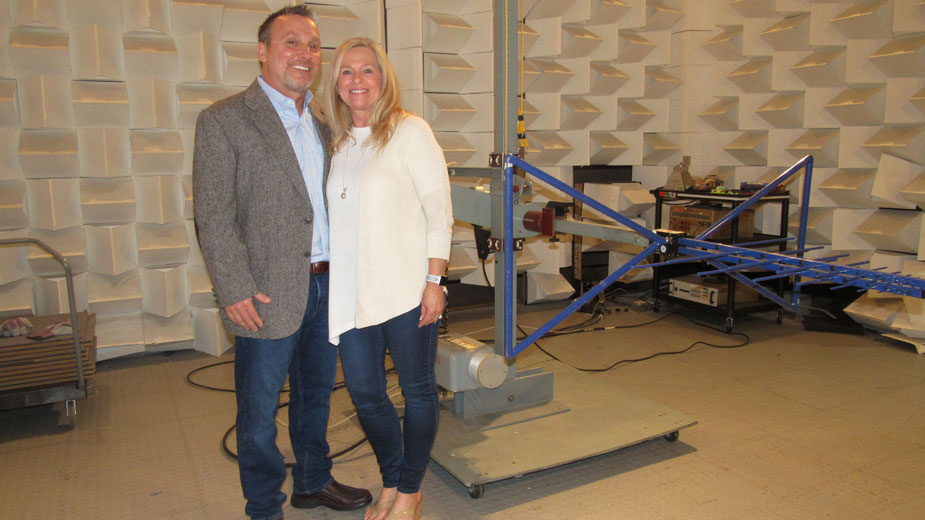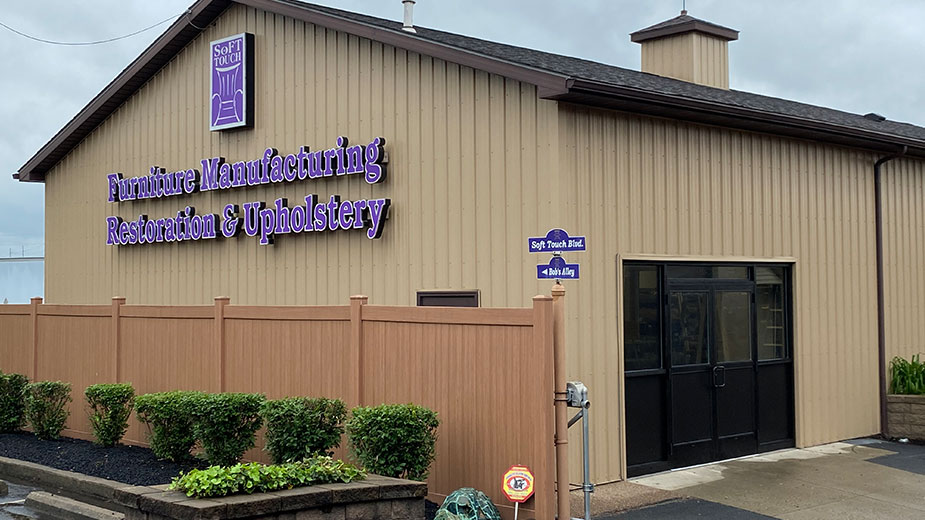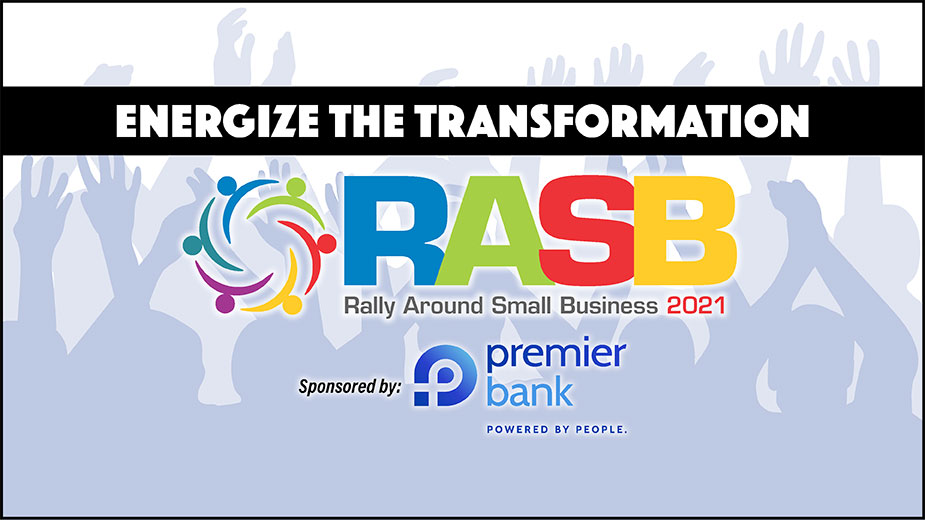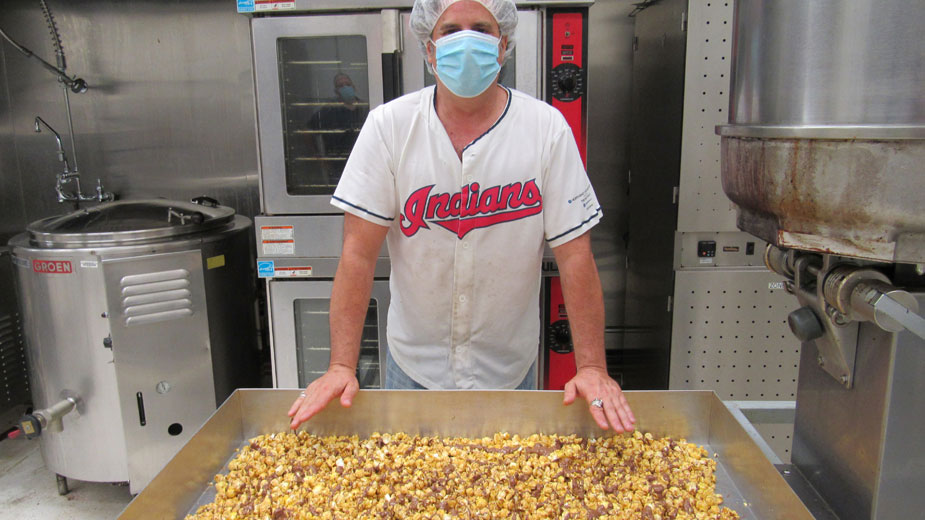Keystone Compliance Increases Scope, Expands
By Jeremy Lydic
NEW CASTLE, Pa. — At Keystone Compliance, workers ensure the safety and dependability of their customers’ products by freezing, burning, zapping, soaking and shaking the heck out of them.
From high-frequency electromagnetic waves to high-pressure water blasts to simulating a lightning strike, a walk through the 20,000-square-foot building of the company just off West Falls Street finds workers putting items to the test.
In one room, a test engineer uses a custom-built pneumatic device to evaluate the up-and-down motion of an aircraft copilot seat for 20,000 cycles. In a sealed testing chamber, an engineer zaps a pair of borescopes with electromagnetic waves to be used on a Navy ship – one of the most severe tests the company performs, says its president, Tony Masone.
“Customers bring it to us to see if we can break it,” he says. “And our guys try really, really hard.”
Masone and his wife, Rhonda, co-founded the company after leaving their jobs at an aircraft manufacturer in southern California. In the early 2000s, they recognized the need for product testing in other parts of the country, particularly New Castle where Masone grew up, he says.
“I knew there was a void in the testing arena between Pittsburgh and Cleveland,” Masone says.

In 2007, they left California and founded Keystone with Masone’s oldest son. Keystone didn’t take on much debt in its first year because it purchased used equipment and kept up with “waves of work” by working overtime, late nights and weekends, Masone says, primarily performing electromagnetic compatibility testing. Hiring was a challenge because of the specialty nature of the work.
“Some of the positions we had to fill, you might have a six-month to 12-month training period for that person,” he says. “So if our workload was heavy, that new person might not necessarily help us dig out of that hole.”
After the Great Recession, Keystone expanded its capabilities and started hiring. The company enjoyed double-digit growth in the first three years and by the fourth year it had outgrown its original 7,200-square-foot space.
One of the keys to growth is hiring people “who do a better job than you do” at certain things, says Rhonda Masone, vice president. One of the first employees was the Keystone general manager, Sam Mastovich, whose background in mortgage lending helped them with financial decisions, she says.
“He knew exactly what to do, how to get a loan,” she says. “He would have the paperwork filled out before it was even sent to the bank. It helped guide us into the right steps, the right direction, financially.”
Finding qualified test engineers remains a challenge, she says. Keystone has worked with technical schools and universities to find people with electrical and mechanical engineering backgrounds to fill positions, she says, most of whom are local.
The company is always on the lookout for electromagnetic-compatibility technical engineers, as well as mechanical engineers, “or someone who has good hands-on skills,” she says. “Someone that really takes pride in what they do. We’re willing to train.”
Today, Keystone Compliance employs 25 and is planning to add another 10,000 square feet to its plant and increase capacity again. While there are smaller test labs within a 50- to 100-mile radius, Keystone offers a “full scope of testing” that includes medical, military, aerospace, railway and consumer electronics, Tony Masone says, as well as environmental testing services, including vibration, temperature extremes, corrosive atmosphere and ingress protection.
“What we want to do is provide that one-stop shop in this region. And that’s what we’ve put together and that’s what we’re doing now,” he says.
The bulk of Keystone’s clientele is in the region between Pittsburgh and Cleveland, stretching into Columbus and Cincinnati, with some clients in California and Florida as well. Within the next five years, Keystone looks to open additional locations around the country.
To do that, the company must continue to add to its scope of services, thus the need for the expansion, he says, which he expects to drive annual growth up to 12% over the next few years. Masone says as the company adds testing capabilities, global expansion could follow.
“The more scope that we have in-house, that scope enables us to win more test programs that perhaps fall into another scope that we have,” he says. “If we don’t have the capabilities to perform a certain test, we may lose other testings.”
Trade shows provide good insight into what capabilities are needed and where they’re needed most, Rhonda Masone says. Currently, Keystone looks to capitalize on a recent upswing in the aerospace industry, as well as shipment package testing for Amazon, she says.
“We want to work with people who sell to Amazon to be compliant with Amazon package testing,” she says. “That is definitely something we’re growing with at this point. We’re now one of their labs that serve that purpose.”
Copyright 2024 The Business Journal, Youngstown, Ohio.


